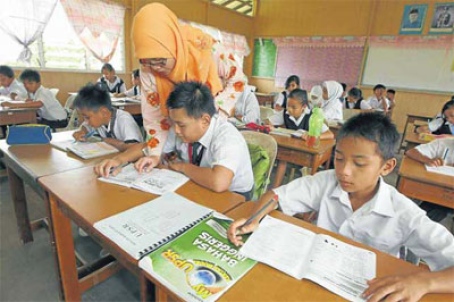Leaders don’t play catch up
Professor Tan Sri Dato' Dzulkifli Abdul Razak
Learning Curve: Perspective
New Sunday Times - 04-12-2011
The Organisation of the Islamic Conference needs disruptive innovation to lead the Islamic World in reclaiming its rightful place.
FOLLOWING the discussion on “disruptive innovation” last week, the Organisation of the Islamic Conference (OIC) member states’ forum and exhibition on Higher Education Services, held from Nov 28 to Dec 1, highlighted numerous opportunities to do so.
For starters, it was claimed that Arab Spring was due to the “failure” of higher education in several of the countries. There was growing unhappiness that tertiary education and universities were unable to provide for students, causing them to revolt against the status quo.
OIC secretary-general Professor Ekmeleddin Ihsanoglu says: “The critical impact of higher education on the socio-economic development of our societies and equipping our youth to address the challenges of the 21st century can hardly be overemphasised.
“It is important that our strategies in the field of higher education are relevant to these objectives with the ultimate goal of improving the quality of life of our people.”
Indeed, the Charter of the OIC places a high premium on the acquisition and dissemination of knowledge as a way to “reclaim its rightful place in the international community”.
Overall, the OIC has no doubt made progress over the years, but many remained unimpressed.
For example, the average spending on research and development is still at 0.41 per cent in 2011, although this is double that in 2005. The number of researchers, scientists and engineers engaged in research and development is 649 per million from 250 in 2003. Progress is deemed slow and not “disruptive” to reclaim the desired role and place as indicated earlier.
The OIC has less than a decade to arrive at Vision 1441H adopted in Putrajaya in 2003.
Likewise, the 10-year Programme of Action in areas of higher education, science, technology and innovation adopted in Mecca two years later.
The latter calls for effective reformation and improvement of educational institutions and curricula at all levels in OIC member states, Malaysia included. Whether this has been achieved is perhaps the key question that needs to be raised.

A 10-year programme of action adopted in 2005 calls for effective reformation of curricula at all levels in OIC member states, Malaysia included.
How “effective” are the reforms and improvements?
How empowered are the various communities to own, manage and control the higher education system to make it more responsive to local needs and aspirations, as suggested by the secretary-general?
In my keynote address at the meeting, I made the observation that OIC , by and large, is reactive in its action. It is still modelled after what has been accepted by the international community, all within the framework and groupthink based on the “business-as-usual” approach.
It is not surprising that the OIC Ministers of Higher Education approved a document — Key Performance Indicators: A Guide for Assessment and Quality Enhancement for Universities in the Islamic (sic) World — earlier this year. In addition, the Association of Quality Assurance Agencies of the Islamic (sic) World has also recently established its secretariat in Kuala Lumpur.
It is interesting to note that the words “Islamic World” are repeatedly used when Muslims, at all levels, meet and set their agenda. However, this is not concretely premised on the world view that is Islamic, as evident from its “playing catch-up” strategy and mentality.
The so-called “Islamic World” is merely a duplication of what it is not; and therefore begs the question: why label it differently in the first place?
It is only when we dare to venture boldly and differently, let alone be disruptive in innovative ways, can we justifiably qualify the meaning of “Islamic World”; and give the statement “to reclaim its rightful place” the clarity and focus it needs.
The essence of education, which begins with the word “read” or “iqra” in the Quran, must be sufficiently understood as an embodiment of holistic human being going beyond just utilitarian dimensions in the capitalistic sense.
It is here that OIC needs disruptive innovation to lead the Islamic World in reclaiming its rightful place.
As participants at the meeting were reminded, OIC needs to exhibit leadership rather than just play catch-up!
- The writer is vice chancellor of Albukhary International University
